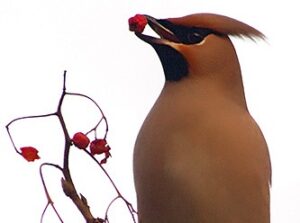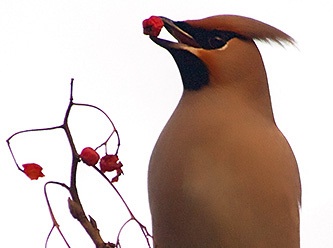
Flocks of exotic-looking feathery tourists are visiting Merseyside in increasing numbers.
A number of the beautiful Waxwings have been sighted across the region as they migrate to Britain from Scandinavia looking for food.
The birds which feed on cotoneaster and rowan berries have a habit for turning up in urban areas such as school playgrounds, supermarket car parks and even petrol stations.
Wendy Johnson from the RSPB told JMU Journalism: “Because they are winter visitors, most of us are probably not as familiar with them as we are with our resident birds, so that just adds to the excitement when they do start to arrive in Britain. They come from Scandinavia mainly due to poor food supplies or harsh weather there.
“They do this every year but some years we have lots more arriving than usual so they’re more noticeable.”
The birds get their name from the deep red tips on their flight feathers, which resembles the colour of old-fashioned sealing wax.
@WaxwingsUK tracks sightings of the birds throughout the UK. They have so far been spotted in Bootle, West Kirby, and Liverpool City Centre as well as a number of sightings in the Chester and Warrington area.
Johnson said: “They often travel in flocks and move around together, taking advantage of a good food source and then moving on, so they don’t stick around in any one place for very long. They are not fussy about where they eat.”
Tom Marshall, from Cheshire Wildlife Trust, said: “The arrival of waxwings is always exciting. As each autumn and winter is different we never really know how many might visit us in the UK, but there are already plenty of reports this year.
“As they’re so occupied with feeding, you can often get pretty close and pick out the gorgeous colours on waxwings, who really look like they belong in a rainforest, not chilly snow-covered countries like Sweden.”
Arriving in autumn, Waxwings can sometimes stay around in the UK until April in spring, before heading north again to breed.
Providing mealworms and apples in the garden can help waxwings if they are struggling to find natural food sources.

